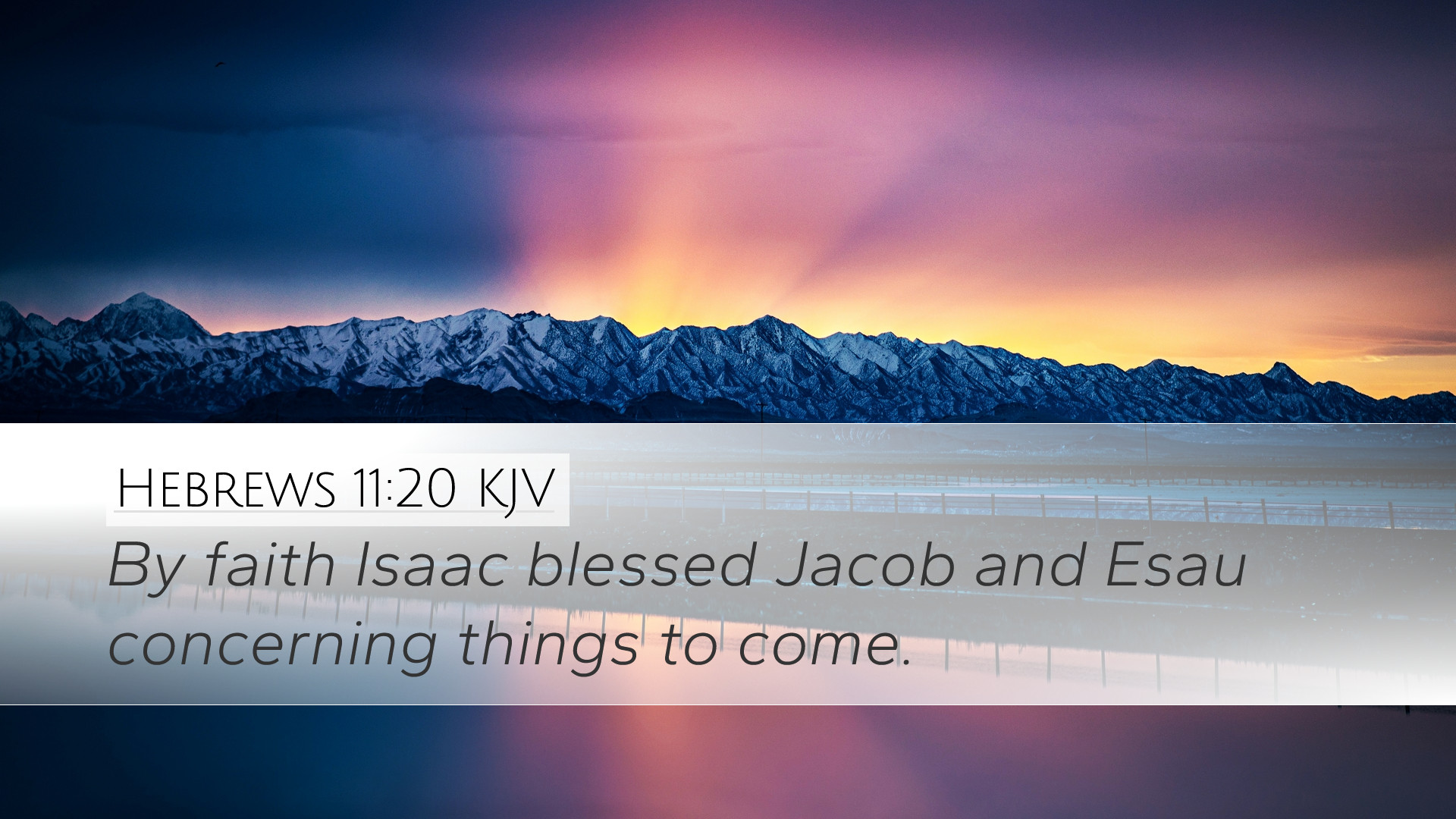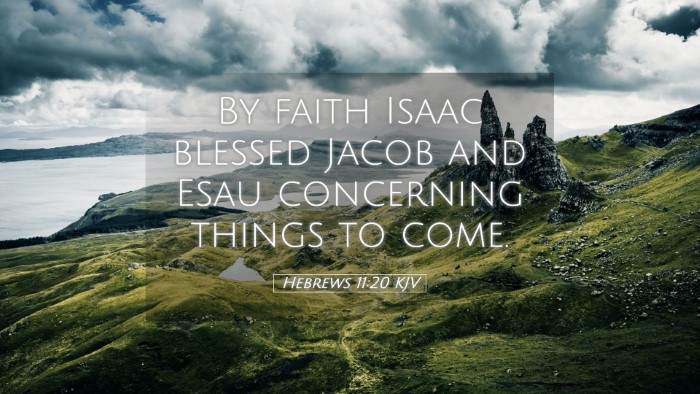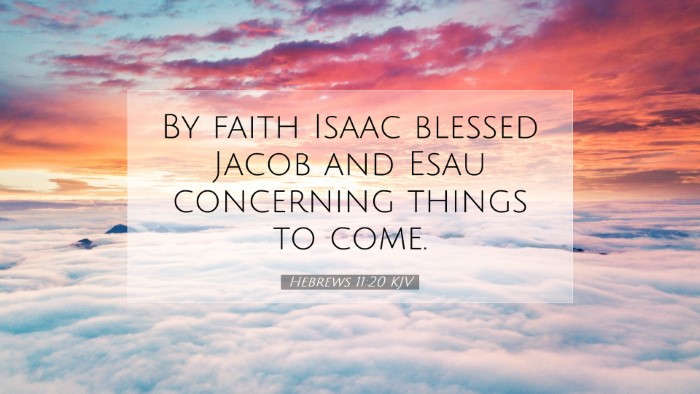Hebrews 11:20 - Commentary
Verse: "By faith Isaac blessed Jacob and Esau concerning things to come."
This verse captures a pivotal moment in the biblical narrative concerning the patriarch Isaac, his sons Jacob and Esau, and the profound importance of faith in the unfolding plan of God. Within the context of Hebrews 11, often referred to as the "Hall of Faith," this verse is significant in illustrating the generational transfer of faith and blessings.
Context and Background
The Book of Hebrews is written to encourage believers to persevere in their faith. The author emphasizes the importance of faith through various examples from the Old Testament. Chapter 11 serves as a tribute to individuals whose faith led them to significant actions, and verse 20 focuses on Isaac's role in the lineage of the covenant.
Commentary Insights
1. Faith of Isaac and Prophetic Blessing
Matthew Henry notes that Isaac's blessing was done by faith, as he was aware of the promises made to Abraham regarding the posterity of his lineage. Isaac’s act of pronouncing blessings upon Jacob and Esau concerning future events illustrates the faith required for such a declaration, particularly as it pertained to God's covenant promises.
Albert Barnes comments on the gravity of Isaac’s blessing, acknowledging that it was a significant spiritual act that carried divine power. His blessings were not mere parental wishes but were laden with the seriousness of prophetic insight, particularly as the choice of the heir who would carry forth God's promises.
2. The Nature of Isaac's Faith
Isaac’s faith, although less prominent and more passive compared to Abraham's dynamic faith, played a crucial role in the divine plan. Adam Clarke contrasts Isaac's submission to divine will with Abraham's more assertive faith. Isaac’s willingness to bless Jacob, despite the complicated dynamics at play, reflects his trust in God’s ability to fulfill His promises.
The notion of faith in Hebrews emphasizes that faith can manifest in various forms. While Abraham demonstrated bold actions, Isaac's faith demonstrated trust and acceptance of God’s sovereign will, as he later favored Jacob, recognizing the significance of God's choice.
3. The Blessing of Jacob and Esau
The blessings bestowed upon Jacob and Esau signify more than familial favor; they underscore God's predetermined choice. This is further confirmed by Matthew Henry, who points out that Jacob received the blessing that aligned with God's will and prophetic intent, despite the ethical concerns surrounding how he received it.
Albert Barnes suggests that Isaac's faith allowed him to see beyond the immediate circumstances into the overarching divine plan at work, providing a crucial understanding for us today regarding the importance of discernment and reliance on God's leading when imparting blessings.
Theological Implications
The theological implications of Hebrews 11:20 extend into discussions on faith, providence, and the sovereignty of God. Isaac's act of blessing Jacob and Esau reveals the intricate interplay between divine sovereignty and human actions.
-
Human Responsibility:
The example of Isaac illustrates human responsibility in fulfilling God’s purposes. Though God had chosen Jacob, the act of blessing at the hands of Isaac was crucial for legitimizing that choice in the eyes of God's covenant community.
-
Sovereign Choice:
The particular blessing upon Jacob illustrates the theme of God's sovereign choice, foreshadowing themes of grace and election that permeate the New Testament. Adam Clarke notes how Isaac's blessing speaks to the future generations, highlighting the importance of understanding our roles within God’s broader narrative.
-
Faith in Action:
Isaac’s action serves as a reminder for believers today to put their faith into action, trusting in God to fulfill His promises even when circumstances seem complicated or uncertain.
Practical Applications
For pastors and teachers, Hebrews 11:20 offers profound lessons:
-
Encouragement in Trials:
Just as Isaac blessed his sons amidst uncertainty, so too can believers offer blessings and encouragement to others during difficult times.
-
Passing on the Faith:
This verse challenges leaders to effectively communicate faith to the next generation, ensuring the continuation of God's narrative through teaching and example.
-
Unity in Diversity:
The narrative surrounding Isaac’s blessing reminds congregations of the importance of unity despite diversity of gifts and callings, emphasizing God's ultimate plan for His people.
Conclusion
Hebrews 11:20 encapsulates a moment where faith and divine promise intersected through the actions of Isaac, modeling a response that is critical for all believers. The insights gleaned from noted commentators illustrate the multi-faceted application of this verse, affirming its relevance to contemporary faith communities. In understanding Isaac's blessing of Jacob and Esau, we are reminded of the deeper truths of God’s unwavering faithfulness and the call to live out our faith with conviction.


